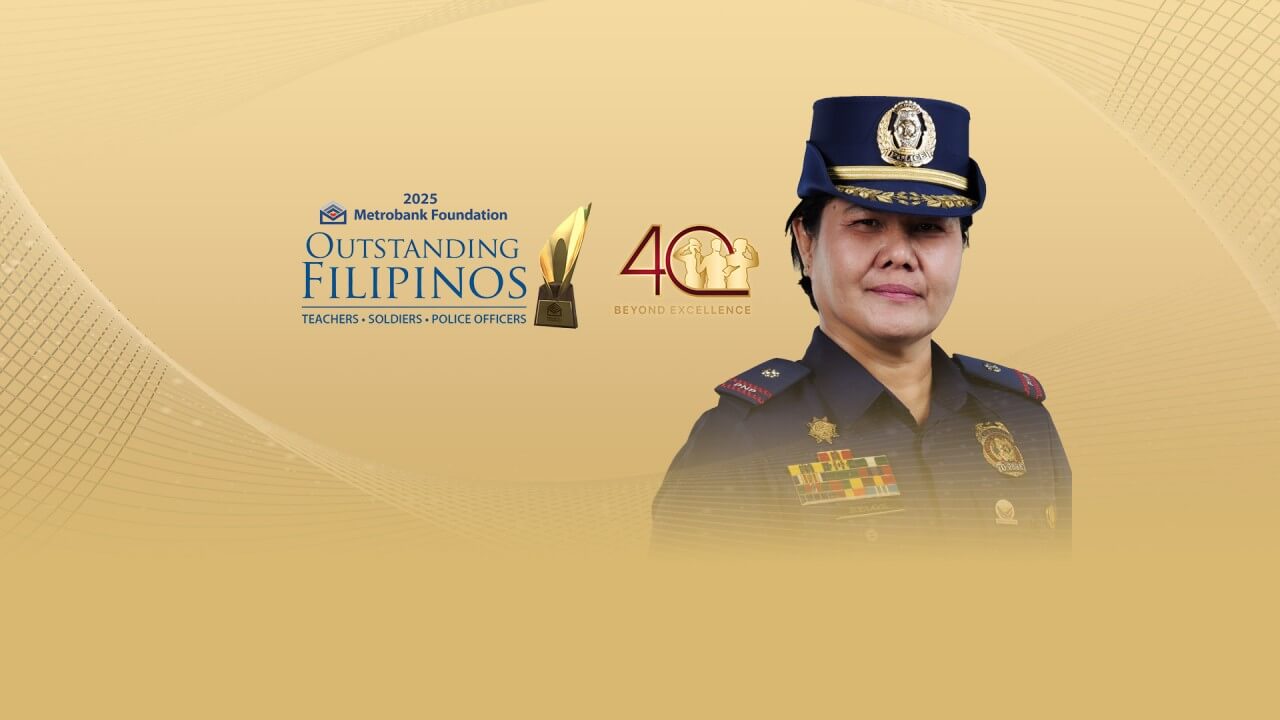

InsiderPH features the inspiring stories of Metrobank Foundation’s awardees as Outstanding Filipinos for 2025—teachers, soldiers and police officers who are making significant contributions to nation building.
Here, maritime borders are more porous than the lines on a map. The short trip to Sabah, Malaysia, is as ordinary as crossing a street. It is also, inevitably, a route for the trafficking of human beings.
For Police Major Elmira A. Relox, who served from 2014 to 2018 as Tawi-Tawi’s Women and Children Protection Desk Officer, the province was both a frontline and a proving ground.
“Tawi-Tawi is considered the southern backdoor of human trafficking,” she says. “It’s the last stop before victims are smuggled out to Malaysia.”
Her answer to the problem was quietly radical – not a single sweeping crackdown, but a painstaking architecture of tools and systems. She designed a Human Trafficking Route Map to visualize known and suspected transit corridors and paired it with a standardized “Trafficking-in-Person (TIP) Take-In Form” to facilitate the processing of victims.
The aim, she says, was “to establish a system for monitoring and managing cases, so we could see the patterns and cut them off.” Over four years, her methods helped rescue 1,347 victims and execute 185 anti-trafficking operations.
But she also understood that prevention mattered as much as rescue.
Justice denied, resolve strengthened
She remembers the rescue of a sixteen-year-old from Manila, recruited with the promise of a job in Malaysia. The girl traveled alone, guided by a few lines of handwritten instructions. In Tawi-Tawi, she was passed from one facilitator to another, taken to a passenger inn, and raped before she could be smuggled onward.
The girl escaped and found her way to the police. “We gave her immediate medical care,” she says, “and learned she had contracted a sexually transmitted disease (STD).”
The suspects were arrested; the case, ultimately, was dismissed when the victim could not appear in court.
“We fought for her,” PMAJ. Relox says. “Justice was denied. It was painful, but it made my resolve stronger. It showed me the ugly truth behind human trafficking and the deep trauma it inflicts.”
For PMAJ. Relox, that case reinforced an already strong conviction: to give voice to the voiceless, to protect those who have no one else, and to make the act of rescue a restoration of dignity.
From struggle to service
“My true fulfillment,” she says, “comes from seeing the strength of the people I serve and knowing I’ve helped them on their path to safety and justice.”
Her own path to the police service began not with an ambition to wear the uniform, but with hunger, literal and remembered.
She grew up in a family of nine siblings, raised by her mother alone. “Life was hard,” she says.
“There were times we had nothing to eat, and my mother sacrificed so much just to get us through each day.” That kind of poverty, she adds, “shapes you. You learn early what it means to struggle, and you see how many others live the same way.”
When she entered the Philippine National Police in 1998, it was out of necessity. The salary offered stability; it allowed her to send money home, help her younger siblings, and eventually raise her own family.
Over the years, however, she began to see the power of the uniform – how presence, action, and integrity could change a community.
“It’s a chance,” she says, “to stand for those who cannot stand for themselves.”
Laying foundations of protection
Her strategy extended beyond interdiction. She pushed for a “One Stop Processing Center” for deportees from Sabah, a place where returnees could receive medical care, food, and assistance before being sent back into situations that had made them vulnerable in the first place.
She oversaw the creation of Home Away from Home, the first temporary shelter for women and children in crisis in Tawi-Tawi. “It is a safe place,” she says, “where they can stay while their cases are being processed, instead of returning immediately to the very environment where the abuse happened.”
Later, as Chief of Police in Tandubas Island, she launched “Peaceful Beginnings,” an initiative to encourage the voluntary surrender of unlicensed firearms. “When firearms are surrendered,” she says, “we take away the tools that could harm, and we open a path to dialogue and peace.”
Now, as Chief of the Regional Women and Children Protection Desk in the Police Regional Office Bangsamoro Autonomous Region, she is working to institutionalize the systems she pioneered in Tawi-Tawi, and to train younger officers, especially women, to carry them forward.
“You must serve with heart, honesty, and courage,” she tells them. “That is the only way to truly protect the vulnerable.”
The waters around Bangsamoro remain as open and mutable as ever, a maritime border that resists containment. But in the maps and methods that PMAJ Relox leaves behind, there is a record of how one officer refused to accept that the tide could not be turned. —Metrobank Foundation